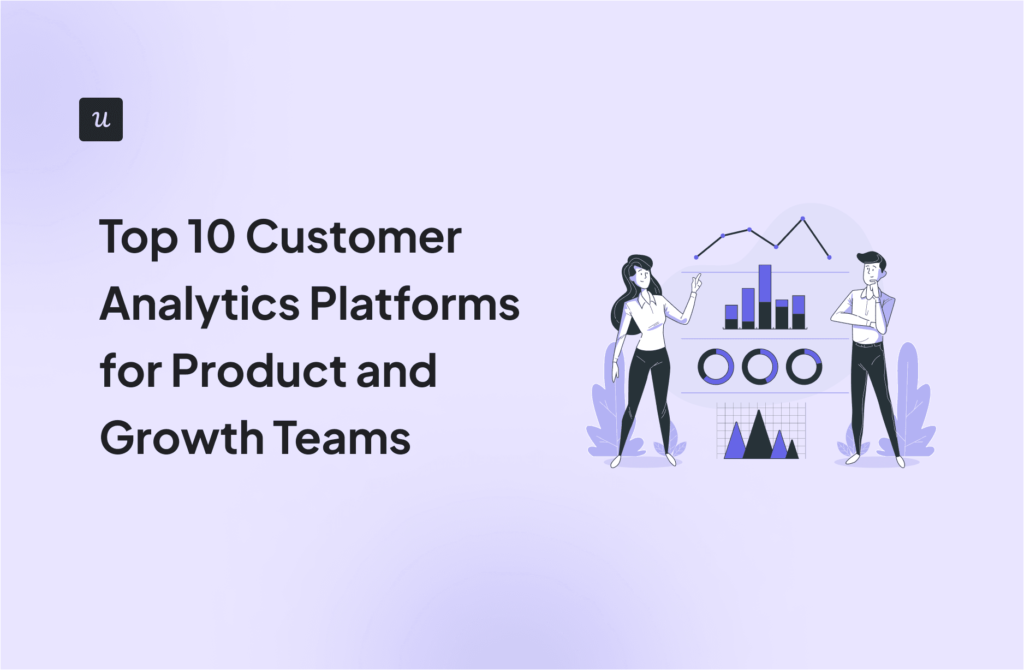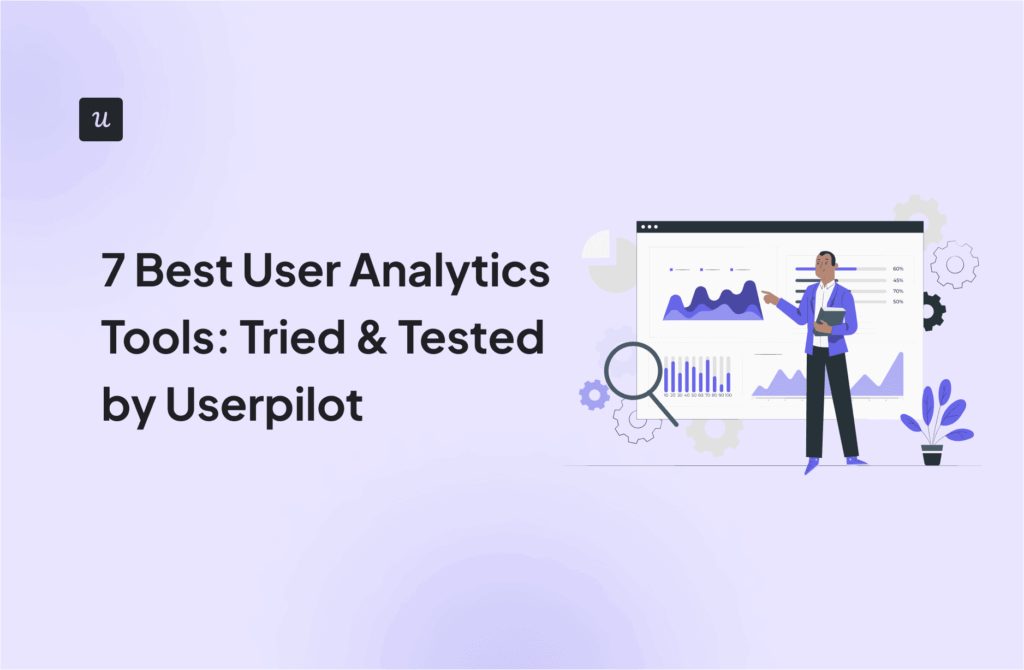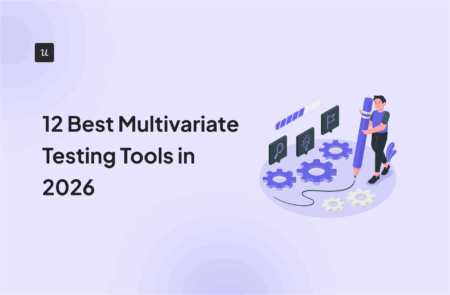
There are so many multivariate testing tools available that it can be difficult to choose the right one.
To help you make the best choice, we’ve meticulously curated a list of the 12 best options available in 2026.
Whether you’re a seasoned marketer or a budding entrepreneur, this comprehensive guide will equip you with the knowledge and resources to elevate your product analytics and optimization efforts.
Let’s dive in!
Overview of best multivariate testing tools
- Multivariate testing is a technique for experimenting with multiple variations of different elements on the same page to determine which combination yields the best results.
- In other words, multivariate testing is an advanced version of traditional A/B testing that compares only two variables.
Top 12 testing tools for conversion optimization
- Leanplum – Best for mobile A/b testing.
- Optimizely – Best for feature launch testing and website optimization.
- AB Tasty – Best for conducting multiple tests simultaneously, especially for e-commerce.
- Split – Best multivariate testing tool for dark launch test.
- Leanplum – Best for mobile A/b testing.
- Userpilot – Best all-in-one product growth platform.
- Omniconvert – Best for combining qualitative data with multivariate testing.
- VWO – Best multivariate testing tool for inexperienced users.
- Google Analytics – Best free web analytics and testing tool.
- ActiveCampaign – Best for email testing and advanced targeting.
- Mutiny – Best testing tool for B2B companies.
- Crazy Egg – Best testing tool with heatmaps and session recordings.
- Qubit – Best with advanced omnichannel personalization solutions.
What is multivariate testing?
Multivariate testing is a technique for experimenting with multiple variations of elements on a webpage or app simultaneously to determine which combination yields the best results.
Compared to traditional A/B testing, this method allows for a more comprehensive understanding of how different elements interact and influence user behavior.
Multivariate testing vs A/B testing
Multivariate testing and A/B testing are both essential tools for optimization, but they differ significantly in their approach and complexity:
- Number of Variations: A/B testing compares two versions (A and B) of a single element, while MVT tests multiple variations of multiple elements simultaneously.
- Complexity: MVT is more complex to set up and analyze due to the numerous variations and interactions involved.
- Traffic requirements: MVT generally requires more website traffic (or a higher number of users if you’re conducting an in-app test) to reach statistical significance than A/B testing.
- Insights: The A/B testing process helps identify the better-performing version, while MVT provides deeper insights into the impact of individual elements and their combinations.
Top 12 multivariate testing tools for conversion optimization
Now, let’s dive into 12 of the best testing tools for website and product experiments.
1. Optimizely
Optimizely is a leading experimentation platform designed to help businesses deliver optimized digital experiences. It’s designed specifically for big businesses and enterprises.
Key features
The main functionalities of Optimizely include:
- Visual editor: Designing A/B tests is a breeze with Optimizely’s no-code visual editor. Creating different variations of your website, specifying the audience, allocating traffic to each variation, and publishing the test is all you need to do. You can even create multi-page experiments with the editor. There is also the option of custom coding.
- Omnichannel experimentation: Optimizely offers a full suite of A/B testing features across multiple channels, including websites, mobile apps, and others.
- Feature flags: With Optimizely, you can create targeted rollouts for new features by adjusting the traffic allocation. For instance, you can roll out a new feature for beta users and evaluate adoption before launching it to the entire user base.
- Integrations: The platform integrates with various marketing, analytics, and CRM tools, including Adobe Target and Salesforce.
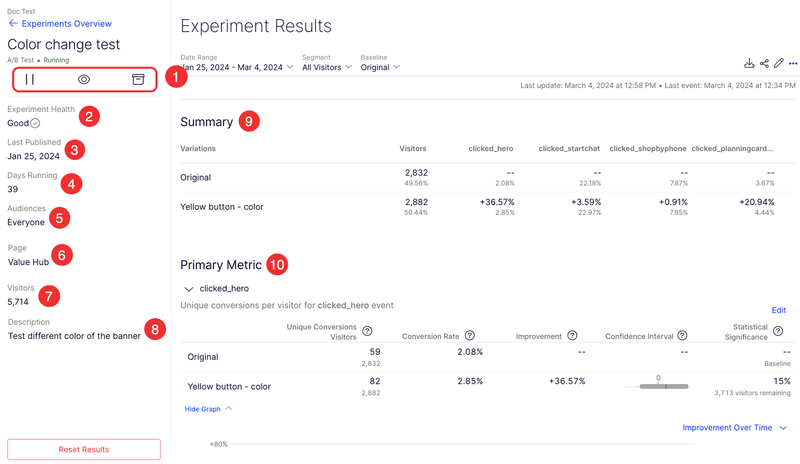
Pricing of Optimizely
Optimizely offers custom pricing based on the specific needs of each business. You can request a demo through their website to explore the platform and discuss pricing options.
2. AB Tasty
AB Tasty is a comprehensive experimentation platform that empowers businesses to optimize their websites and mobile apps. It’s mostly suitable for enterprise e-commerce brands.
Key features
Here are some of the main AB Tasty features for getting the job done:
- Visual editor: The intuitive interface makes creating tests straightforward and accessible, even for non-technical users
- Advanced targeting options: With this tool, you can trigger tests based on URLs, or create custom segments based on geolocation, demographics, and other factors to ensure your tests reach the right audience.
- AI-driven optimization: The AI-driven platform automatically directs traffic to the better-performing variation once it becomes statistically reliable.
- Feature management: AB Tasty includes feature flags and toggles, enabling you to progressively deploy features, conduct server-side experiments, and roll back features automatically if needed.
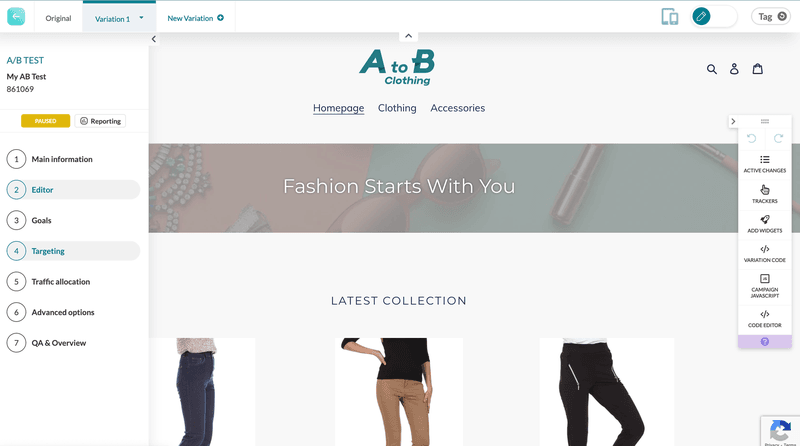
Pricing of AB Tasty
A/b tasty offers custom pricing based on specific business needs.
3. Split.io
Split is a sophisticated feature flagging and experimentation platform tailored for engineering and product teams.
It helps organizations conduct dark launch tests and measure the impact of new features in real-time.
Key features:
Here’s a summary of Split’s relevant functionalities:
- Feature flags: Split’s core functionality revolves around feature flags and toggles, allowing teams to control the release of new features. Split also provides detailed analytics reports to monitor the impact of new features and experiments.
- Data visualization: The platform lets you visualize test performance in graphs and charts. You can share these with key stakeholders—design, marketing, and the support team—for better brainstorming.
- Integrations with data platforms: this is easy with most data platforms, from Google Analytics to Segment or Sentry.
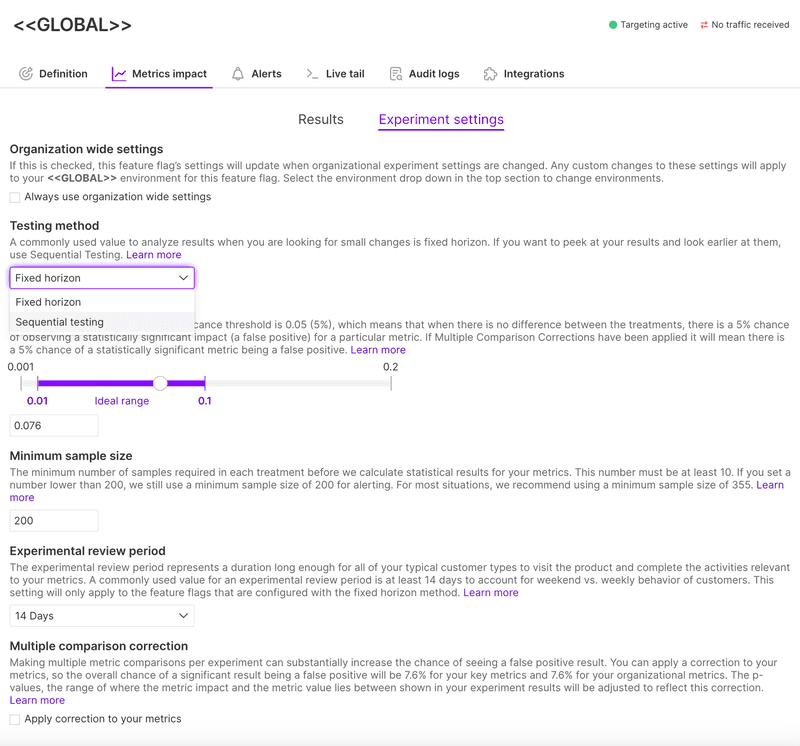
Pricing of Split
- The free version is available for up to 10 seats.
- Team plan: $33 per seat/month.
- Business plan: $60 per seat/month.
- Enterprise: Custom pricing.
4. Leanplum
Leanplum is a mobile marketing and customer engagement platform that provides tools for optimizing user experiences through multichannel marketing campaigns.
It combines lifecycle marketing and live operations (LiveOps) with a robust A/B testing framework, enabling businesses to engage users effectively and drive higher conversion rates.
Key features
Here’s a summary of Leanplum’s multivariate testing tools:
- Automated notification workflow: Besides running experiments, you can create automated workflows that trigger personalized notifications based on a user’s actions. For instance, you can choose between the “immediate” and “delay” triggers for a notification based on whether a user opens the previous message. You can even schedule a trigger-based sequence of notifications for days to come.
- Integrations: Leanplum integrates with other tools like Amplitude, Mixpanel, and Twilio. These integrations ensure seamless data flow, which allows you to easily enhance campaign effectiveness.
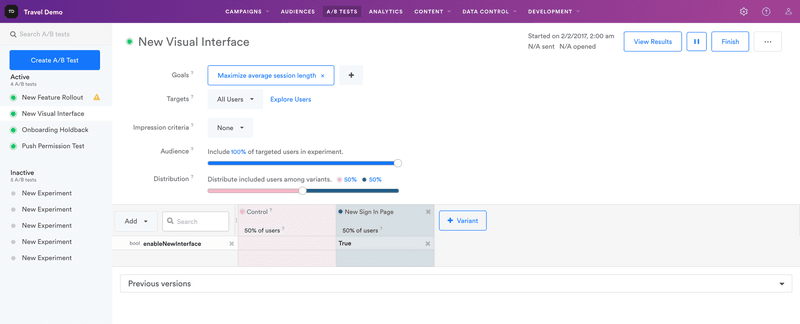
Pricing of Leanplum
Leanplum operates on a quotation-based pricing model tailored to each business’s specific needs.
While detailed pricing information is not publicly available, the platform is known to offer premium plans that include a comprehensive set of features designed for startups to enterprise-level organizations.
5. Omniconvert
Omniconvert is a conversion rate optimization platform specifically designed for website and landing page optimization.
For example, with Omniconvert you can A/B test whether a video or a product demo performs better on your landing page.
Key features
Here’s a brief overview of Omniconvert’s relevant capabilities:
- Split URL testing: Omniconvert lets you compare different versions with the original landing page. You can adjust the traffic allocation to specify what percentage of users will see a particular variation.
- Sophisticated segmentation capabilities: There are over 40 segmentation parameters, enabling you to get insights into your visitors’ demographics, browsing history, and product views and allowing you to provide a personalized customer experience to improve the conversion rate.
- Advanced analytics: You can choose between Bayesian and Frequentist statistics engines depending on your conversion goals and requirements.
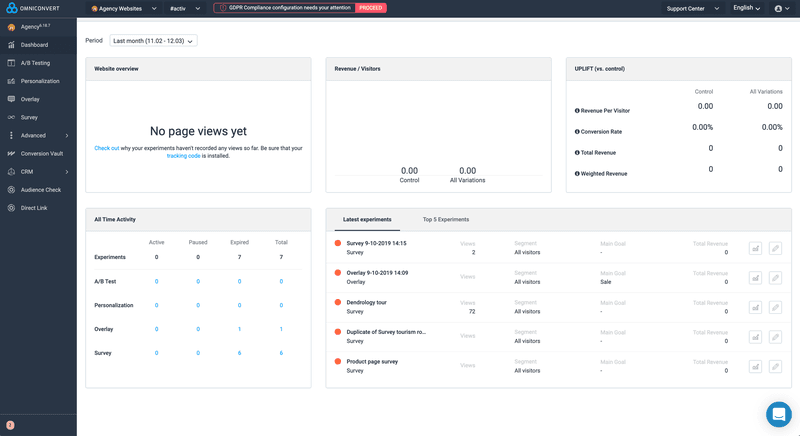
Pricing of Omniconvert
Omniconvert offers a 30-day free trial with no credit card required. The paid plan starts at $273 per month and can increase depending on the number of tests you need to perform monthly.
6. Userpilot
Userpilot is an all-in-one product growth platform that helps SaaS companies increase metrics such as user activation, feature adoption, and revenue growth.
Userpilot is specifically created for testing in-app experiences such as product tours or adoption flows, etc.
Key features
Here’s a brief overview of Userpilot’s multivariate testing functionalities:
- No-code test builder: With Userpilot, you can run product experiments without any technical knowledge. You can create, run, and monitor tests directly from your dashboard just with a few clicks.
- Multiple types of tests: Depending on your needs, Userpilot enables you to choose between controlled, head-to-head A/B testing and multivariate testing.
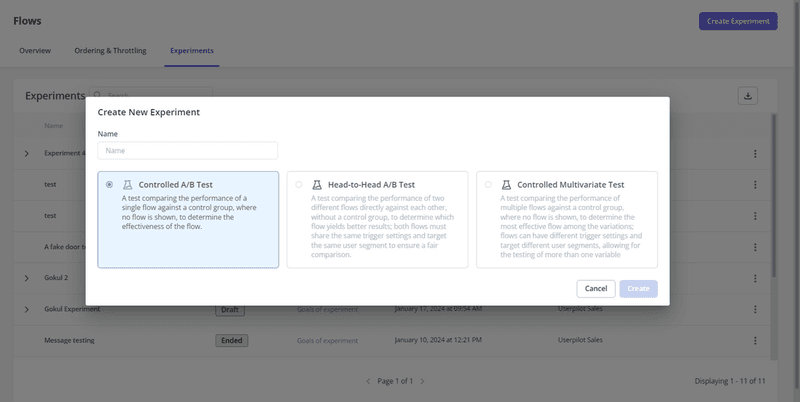
- Advanced settings: Userpilot lets you fine-tune your experiments with precise targeting, segmentation, and scheduling options. You can also use AI content translation to automatically translate test variations into multiple languages.
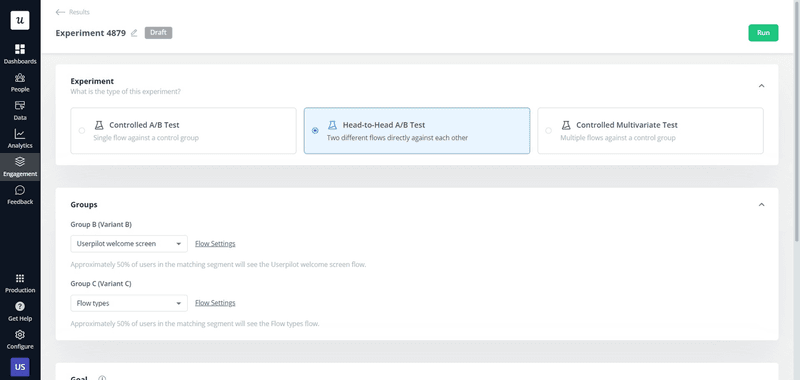
- Real-time reporting: Gain immediate insights into your test’s performance through live updates and visual data analysis. This feature also allows you to easily compare the results of different test variations and make data-driven decisions.
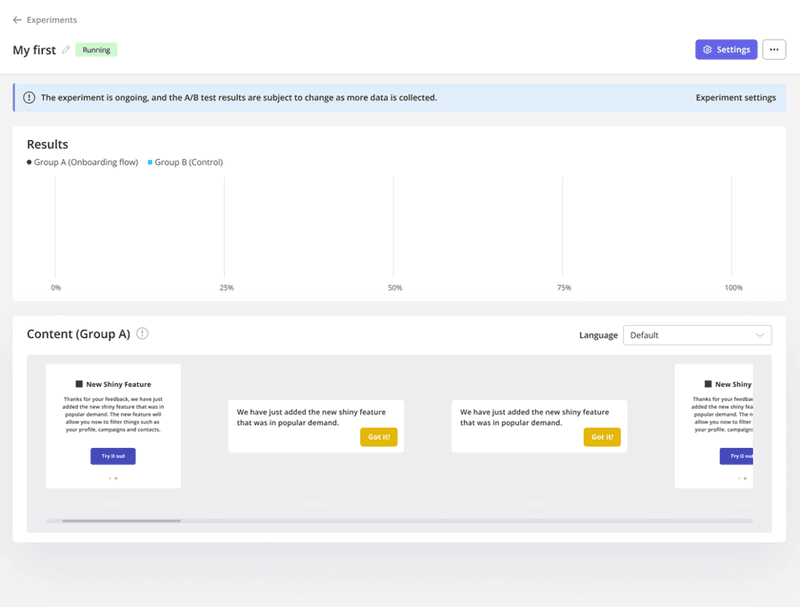
Pricing of Userpilot
Userpilot’s A/b testing and experimentation feature is available in the Growth plan, which is billed annually and costs $ 799/month and comes with other analytics features such as funnel tracking, user path analysis, and retention reports.
7. VWO
Visual Website Optimizer (VWO) is an experimentation platform with a comprehensive suite of CRO tools that let you A/B test different elements, such as the headline, CTA button, and images, to see which variations convert more users.
VWO is mobile-friendly and especially a great choice for A/B testing of iOS and Android mobile applications.
Key features
Here’s a summary of VWO’s main functionalities:
- Code-free editor: Create test variations without writing a single line of code.
- Server-side testing: You can make changes to the test changes without impacting website performance.
- Personalization options: Segment visitors on a number of characteristics and deliver targeted experiences to improve the chances of conversion.
- Performance analytics: Bayesian-powered SmartStats provides accurate test performance data in real-time, even with small sample sizes.
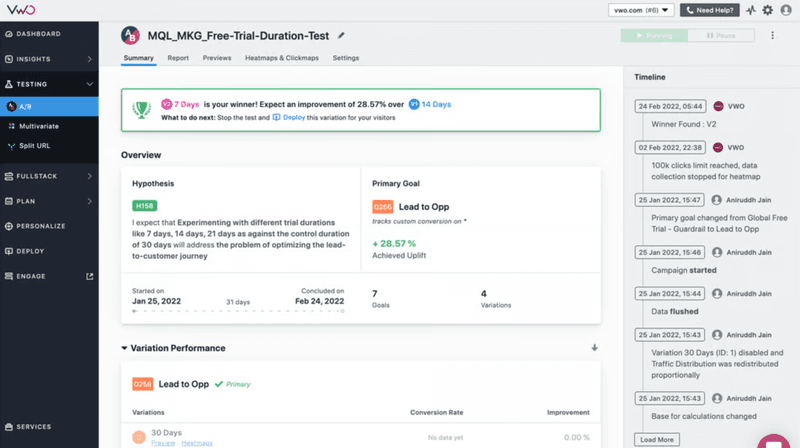
Pricing of VWO
- Free version available.
- Growth: $314 per month.
- Pro: $722 per month.
- Enterprise: $1,265 per month.
Note: The pricing varies depending on whether you’re conducting web experiments, mobile app tests, or server-side experiments.
8. Google Analytics
Google Analytics is a web analytics service offered by Google that tracks and reports website traffic. It provides detailed insights into user behavior, acquisition channels, and website performance, helping businesses understand how visitors interact with their online properties.
Previously, you could easily run multivariate tests with Google Optimize before the service was discontinued.
Here’s how to use Google Analytics for the same purpose:
Integrate your A/B testing tool with Google Analytics and set it up to send your testing events to GA4:
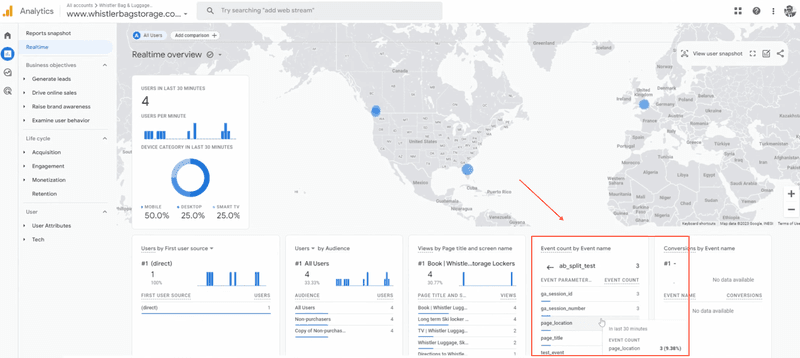
Alternatively, you can create your own reports by heading over to the custom definitions tab:
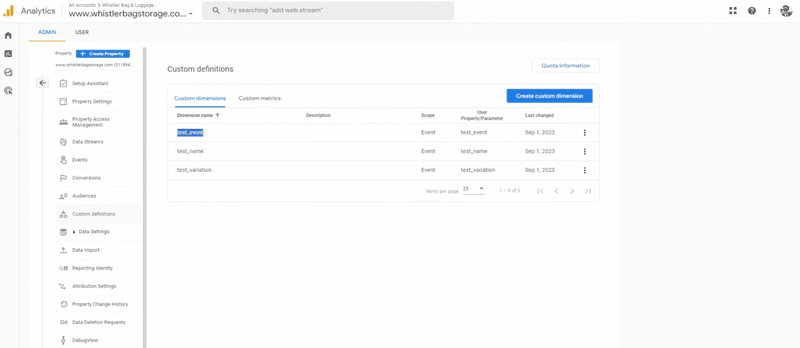
Finally, analyze the A/b test results by comparing event performance.
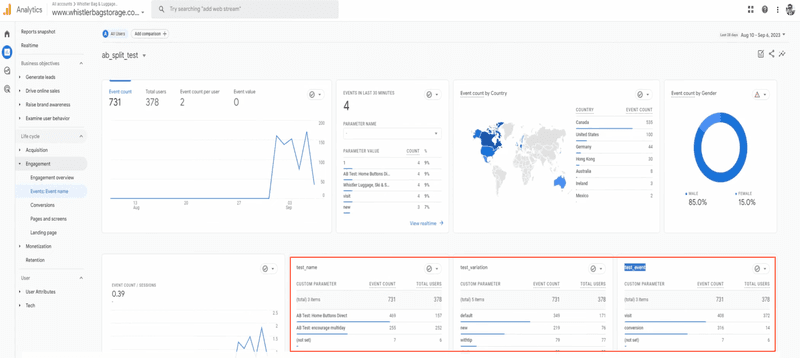
Pricing of Google Analytics
GA is a free tool. However, there is also GA360, a paid version with additional features and capabilities for larger enterprises. The pricing is custom and depends on each business’s specific needs.
9. ActiveCampaign
ActiveCampaign is an email marketing automation platform with robust experimentation and conversion optimization functionalities.
With ActiveCampaign, you can test up to 5 variations of your email template at a time to understand which generates the highest interest among users.
Key features
Here’s a brief overview of ActiveCampaign’s multivariate testing tools:
- Split testing: Test multiple elements in your email marketing campaign, such as email subject lines, content, information, images, and CTA buttons.
- Goal tracking: Set up conversion goals and track the performance of your campaigns to measure their impact on revenue.
- Attribution reporting: ActiveCampaign lets you analyze the customer journey and identify touchpoints that influence conversions. That way, you can make data-driven decisions to boost your conversion rates with confidence.
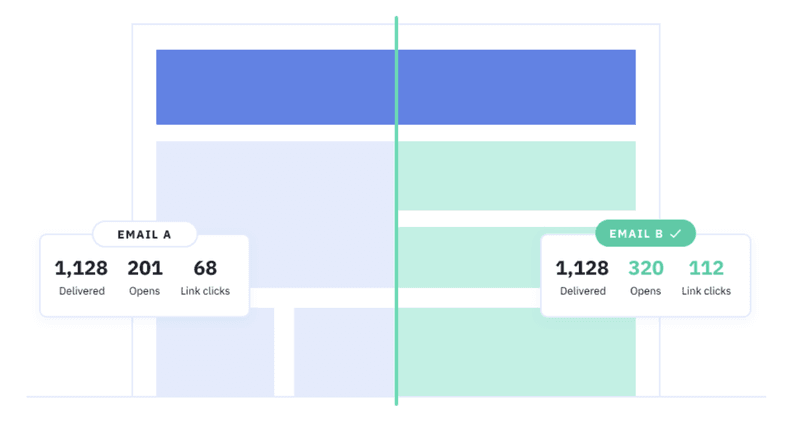
Pricing of Active Campaign
- 14-day free trial available.
- Starter: $8/mo.
- Plus: $49/mo.
- Pro: $79/mo.
- Enterprise: $145/mo.
Note: The pricing increases if you need to track more contacts.
10. Mutiny
Mutiny is a conversion rate optimization platform specifically designed for B2B companies. It leverages AI to deliver personalized website experiences for visitors, aiming to convert more leads and increase sales.
Key features
Mutiny’s robust functionalities include:
- Audience targeting. Build your A/B tests to run for all traffic or different user segments. Target with precision by using information from your data connections, AND/OR groups, and traffic allocation.
- AI-enhanced test builder. Mutiny’s AI helps craft new ideas for your A/B tests. With content suggestions, Mutiny’s AI can make edits for your landing page variant that can still be edited.
- AI-powered recommendations. The platform uses AI to analyze visitor data and recommend the most effective personalization strategies.
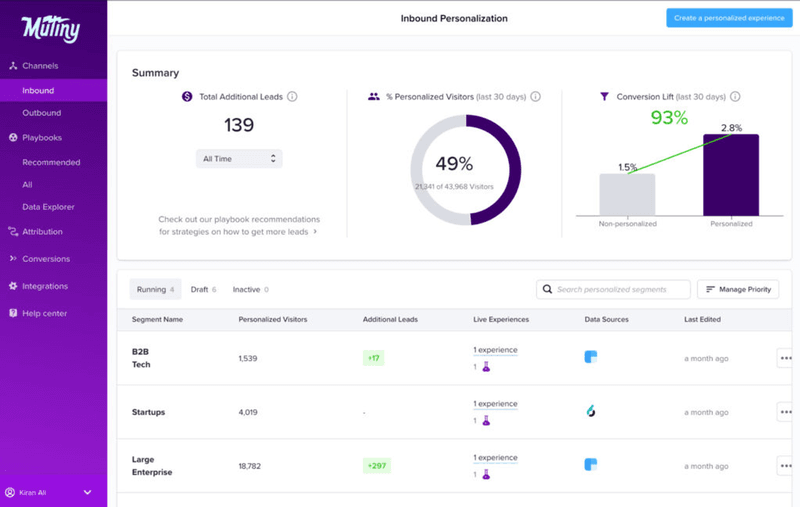
Pricing of Mutini
Mutiny operates on a subscription-based pricing model, tailoring plans to each business’s specific needs and scale.
The company typically customizes the exact pricing details based on the number of visitors and the level of personalization required.
11. Crazy Egg
Crazy Egg is a comprehensive website optimization tool that provides in-depth insights into user behavior through heatmaps, session recordings, and A/B testing.
Although it may not have the most advanced A/B testing features, it is perfect for small businesses looking to understand user behavior, optimize website layouts, and increase conversions.
Key features
Here’s a summary of Crazy Eggs relevant features:
- Heatmaps and scrollmaps: As mentioned, Crazy Egg offers detailed heatmaps and scrollmaps that visually represent user interaction on a webpage. These tools highlight which areas of a page attract the most attention and which sections users tend to ignore, helping you optimize content placement.
- Session recordings: You can record entire user sessions and observe how visitors navigate your platform in real time. This feature helps identify usability issues and areas where users encounter friction.
- Confetti reports: The platform lets you segment clicks by referral source, search terms, or other parameters to understand how different audiences interact with your site.
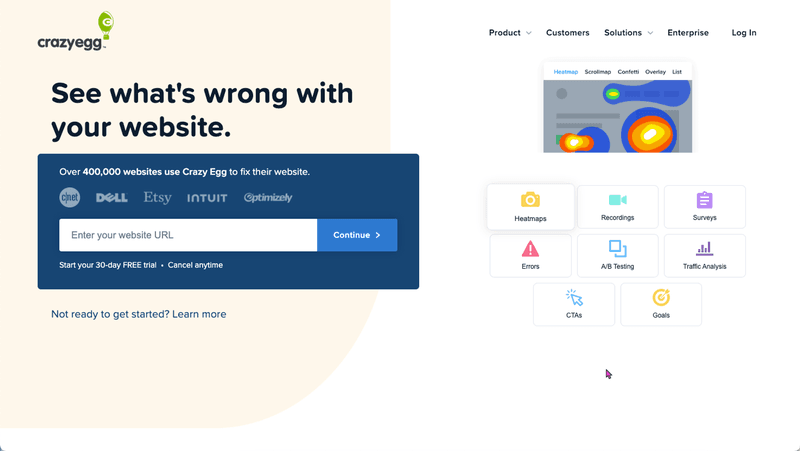
Pricing of Crazy Egg
Crazy Egg offers the following packages:
- 30-day free trial available.
- Plus: $99 /month.
- Pro: $249 /month.
- Enterprise: $499 /month.
12. Qubit
Qubit (now part of Coveo) is an AI-powered personalization platform designed to help businesses deliver tailored customer experiences across all digital touchpoints.
Key features
Here’s a rundown of Qubit’s multivariate testing tools:
- AI-powered analytics: Quit uses AI to verify multivariate testing results, helping to identify false positives among user actions.
- Precise segmentation: Qubit uses machine learning algorithms for segmentation, making it more sophisticated and leading to better personalization.
- Tag manager: Qubit’s tag manager functions similarly to Google Optimize’s tag manager, significantly simplifying the process of working with integrations.
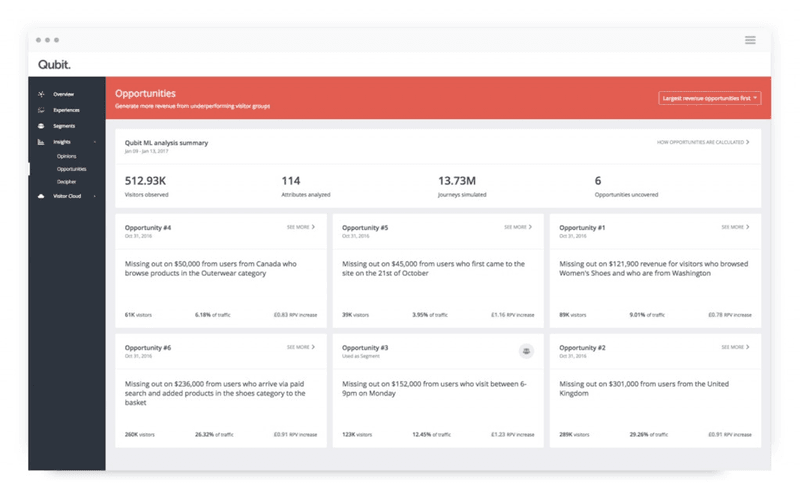
Pricing of Qubit
Qubit doesn’t have defined pricing plans. It offers custom pricing based on specific needs.
Conclusion
Multivariate testing tools make CRO much easier because you can test multiple combinations and choose the combination that converts the most users.
There are different multivariate testing tools available on the market and you need to take into account factors such as your channels, goals, and budget when picking one.
If you want to get started with in-app experiments, Userpilot is your best choice. If you want to learn how you can optimize in-app messages and guides, book a demo with Userpilot and we will show you how.

